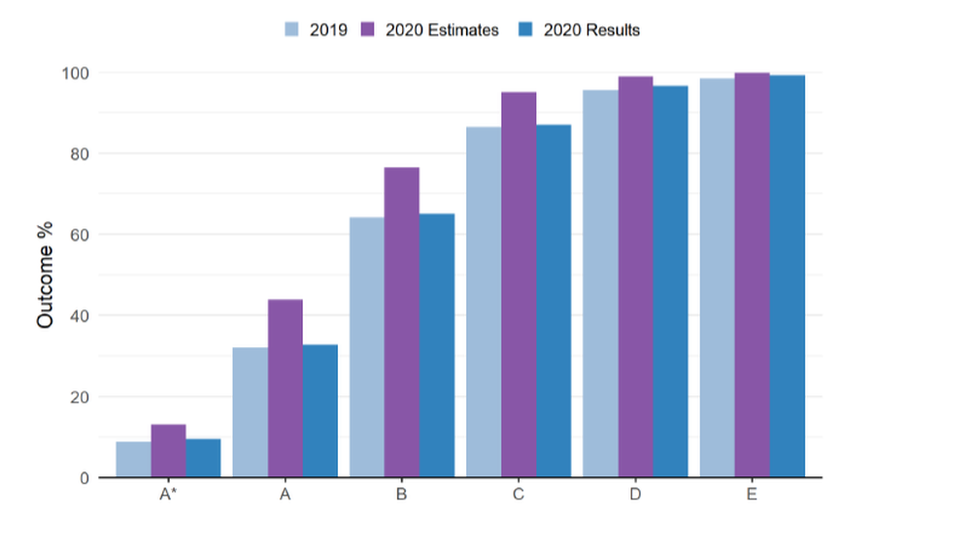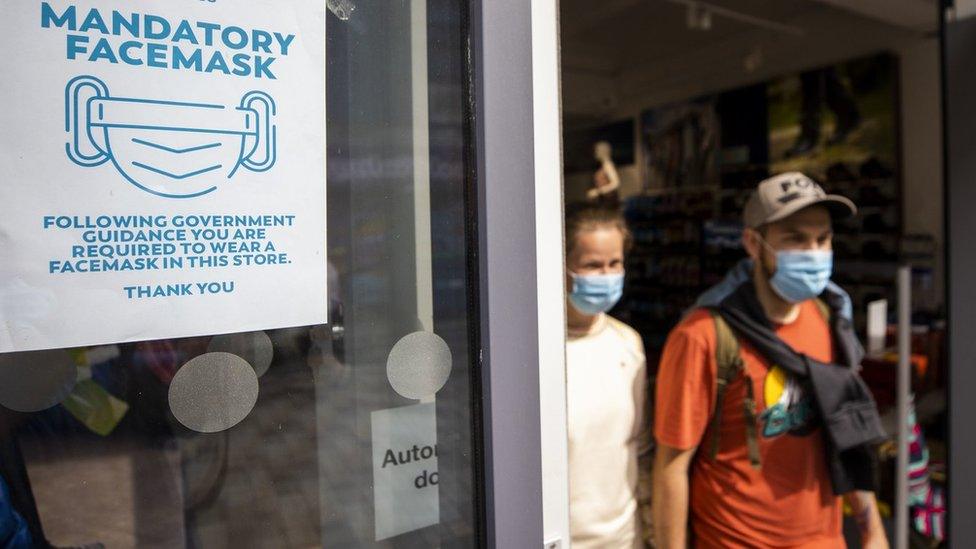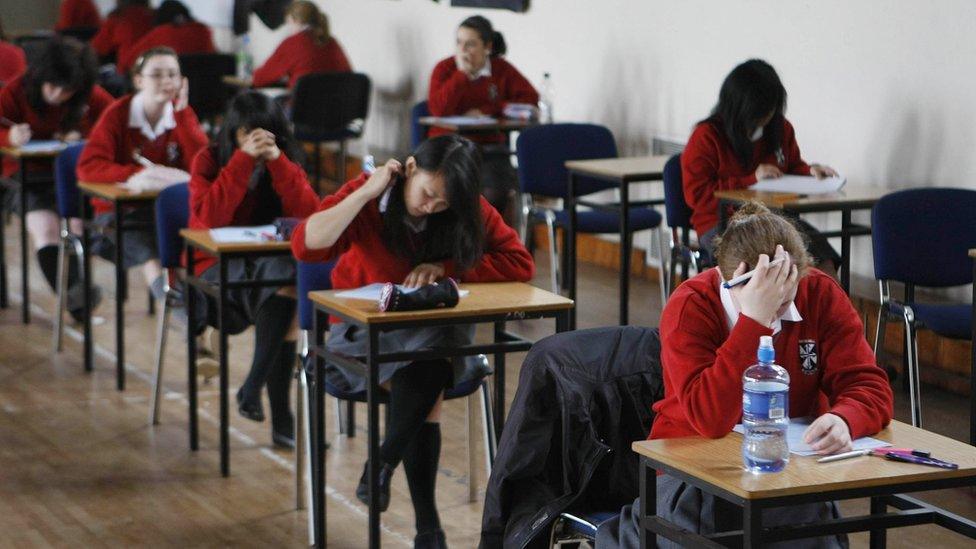Q&A: Northern Ireland A-level results
- Published

Socially-distanced pupils received their A-level results on Thursday morning
Coronavirus has made big changes to our lives this year and schools were one of the areas most deeply affected.
A-level and GCSE exams were cancelled but the question remained - how would students be assessed and grades be awarded?
The chosen scheme involved both teacher predictions and exam body standardisation.
The publication of this year's A-level and AS level results on Thursday raised questions about how successfully the process was handled, with 37% of final results being lower than those grades estimated by teachers.
Following an announcement by the Education Minister Peter Weir on Monday, A-level and AS-level students in Northern Ireland will be awarded the highest grade either predicted by their teacher or awarded officially last week.

How has the grading changed following the minister's announcement on Monday?
Following opposition from pupils, families, principals and politicians, Peter Weir announced important changes to the allocation of grades.
A-level and AS-level students in Northern Ireland will now be awarded the highest grade either predicted by their teacher or awarded officially last week.
The announcement came hours after Mr Weir announced that GCSE results, due to be released this week, would be based solely on teacher predictions.
Mr Weir said the exams body CCEA was working to release the revised results to candidates "as quickly as possible".
He had previously argued that if teachers' predictions alone were used, A-level and AS-level grades would not have "any level of credibility" with the caveat that, "clearly if a national decision was taken, I would want to make sure that our pupils are not disadvantaged and therefore... that would lead inevitably... to a level of change,"
It has since been announced that A-level and GCSE students in England and Wales will also given grades estimated by their teachers, rather than by an algorithm.

How were the A-level grades issued last week calculated?
There were 27,791 A-level results issued in Northern Ireland on Thursday morning.
The majority of the results (86%) were issued by the Northern Ireland awarding body, the Council for the Curriculum, Examinations and Assessment (CCEA). The remaining 14% of results were from exams set by other UK awarding bodies.
Different factors were taken into account in the calculation of results:
Teachers were asked to predict the grades they thought pupils would have achieved had exams gone ahead using information including coursework, mock exams and homework
Schools were also asked to rank pupils in each subject
Schools then submitted that data to CCEA, which said it standardised results to ensure that grades in 2020 were of equal value to those awarded in other years
CCEA's calculations included reference to the student's performance at AS level

How closely did the results issued last Thursday match teachers' predicted grades?
Following the cancellation of exams in March, CCEA was instructed by Mr Weir to ensure the calculated results in 2020 were broadly in line with performance in recent years.
While it recorded an increase - the proportion of A*-A grades awarded to A-level pupils rose by 2.3%, for example - CCEA said it was content this rise was not significant enough to impact the integrity of the results set.
It said data indicated the increases in attainment would have been significantly higher had teachers' predicted grades been used without standardisation.

Teachers' predicted grades (purple bars) were higher than the 2019 results and the 2020 standardised grades

In 96.7% of cases, teacher's estimates either matched or were within one grade of the final result awarded following standardisation.
Of those, 58% of the results matched exactly.
According to CCEA, in 37% of cases teachers were over-optimistic in their prediction, affecting about 11,000 grades.
In about 5% of tests teachers underestimated the result, meaning that about 1,500 grades rose as a result of standardisation.
CCEA has produced a short video explaining how its standardisation process worked, external.
The CCEA standardisation model asked teachers to give a predicted grade for their pupils and then rank them in order within their class.
The exams body then used what it called "other data" to standardise the teachers' results.
For AS results, the pupils' GCSE results were used, as was the performance by their school over the previous three years.
For A-level results, CCEA used students' previous performance at AS level and also took into account "improvements which would have resulted from resits".
However, there are no resits this year as such because A-level exams were cancelled.
If this year's students want to sit an A-level exam they will have to wait until summer 2021 to do so, or possibly autumn 2020 if they took subjects through an English or Welsh exam board.

Can students appeal if their results are lower than expected?
Students can appeal against their A-level results if they feel the grading is unfair.
Unlike in previous years, there will be no charge for appeals.
Prior performance in mock examinations will be used as evidence in any appeal.

Can students resit their exams?
Students can resit their A-level exams.
Education Minister Peter Weir says his department will work to ensure this is done at no cost to the student.

Where can pupils get help?
CCEA is running a dedicated exams helpline for pupils on 028 9026 1260 from 13-26 August.
A comprehensive guide to the awarding process is available on the CCEA website., external

Is there a fair way to award grades without exams?

Even exams can be unfair. Sometimes two people marking the same paper will give different grades.
But this year's assessment and downgrades have left many people feeling their future chances have been harmed by an algorithm.
The standardisation system that led to the downgrades is there to stop grade inflation.
Without it, there would have been a 12% increase in people getting an A* or A grade, according to the head of Northern Ireland's main examination body - CCEA.
But if a school has a stronger year group than last year, or if teaching has improved, that might not be fully recognised this year.
And the information available to calculate grades differs across the UK: like in Wales, AS results contribute to overall A-level results in Northern Ireland and therefore can be taken into account.
However, this doesn't happen in England - where AS grades have no bearing on A-level results.
Research suggests that using AS performance can improve the overall accuracy of grades.
Grades could be calculated using a range of evidence including work to date, mock exams and teacher assessed grades, but even experts can't agree on a perfect way to navigate yet another difficult problem caused by the coronavirus.

- Published13 August 2020

- Published13 August 2020

- Published12 August 2020

- Published16 April 2020
